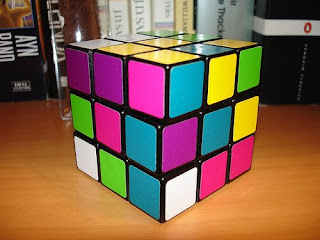The McCain 'straight-talk express' translation: I don't think anyone needs or wants to hear any more about Barack Obama right now. Anyone wanting to know more about him, his ideals or his policies can (and will) consult the multitude of media on the subject including--but not limited to--the two books he has authored.

photo by allieTM
Introduction
So instead of talking about Obama, I will use the former Vice Presidential candidates as an introduction to my next topic, a series of posts I call "You're Smarter Than You Think".
Contrary to popular belief, Sarah Palin is not unintelligent. Clearly she has not spent an inordinate amount of time studying political science. For example, she could not name any supreme court decisions other than Roe versus Wade (nor can I, but both of us could learn). Lack of political knowledge could make a legitimate case that Palin was not quite ready to assume the role of vice president, but it says little about her raw intelligence. Her former counterpart, Vice President-elect Joe Biden, has become an expert at giving the public the illusion of political knowledge. He certainly does have political knowledge, but the number of times he misspeaks is quite worrisome if one assumes he makes policy decisions based on this flawed knowledge. In some university and college multiple choice tests, the examinee is penalized marks for incorrect answers. In such a test, I'm not sure Joeseph Biden would score any higher than Sarah Palin on the political science front. It's really quite amazing how many of these smart-sounding people get themselves into positions of responsibility. They make themselves sound smart to create the illusion that the are smart. They often find themselves saying that they are smart, perhaps because they are compensating for their fear that they are not smart enough. The "You're Smarter Than You Think" series is not intended for these types of people who think they are smarter than they are. It is intended for those who underestimate their capability and never reach their full potential as a result.
I was able to predict the winner of the election because of the poor fundamentals of the economy in addition to the low voter confidence in the incumbent party and not because I'm smarter than anyone else. Most people that know me are aware that I'm terrible at remembering names and birthdays, I can't solve a Rubik's cube, I'm not even 'smarter than a 5th grader', let alone a Jeopardy contestant. These facts should not limit myself (or anyone else) from doing anything I want to do in order to be successful. Knowledge is often misunderstood for intellectual capacity. The next series of posts will build on the story of why you very well could be smarter than you think.
.jpg)
3 comments:
What is your definition of "smart"? Is it deductive horsepower, problem solfing, memorization, or how informed you are. Many nonfunctional mentally handicapped individuals can do the Rubik's cube (not surprising because it is a Hungarian invention)... similarly, remembering names and birthdays is something a piece of paper can do, or these days a PDA... neither of which is smart.
On the other hand there is intellectual curiosity, creativity, analytical synthesis and other forms of processing that only smart people do.
As for Sarah Palin, she has more Emotional Intelligence than thought processing MIPS
Excellent questions.. You're quite I bit ahead of me. I'm not sure I will have concrete answers but I will definitely be examining these questions over the next 2-3 posts.
You would love some of Don Tapscott's books (Wikinomics, Grown up Digital). He hits on some of those points in Grown up Digital (knowledge as memory versus knowledge as bringing information together and making sense of it).
Post a Comment